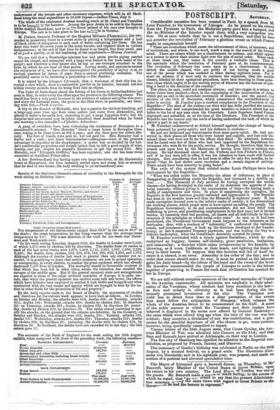We are still without complete accounts of the actual surrender
of Venice to the Austrian commander. All accounts are emphatic in their admi- ration of the Venetians, whose conduct had been excellent to the last— as firm and orderly in adversity as it had been during the im- mensely protracted investment of the city. The 'Venetians now yield less to direct force than to a clear perception of the events that must follow the subjugation of Hungary, which releases the whole of the Austrian forces to be concentrated on the Gulf. A sense of the noble manner in which the Venetians and their leaders have behaved is displayed in the terms now offered by General Radetzky- the same which were offered long ago when the turn of the war was less evident: they comprise a disclaimer of any war-contribution, and a gua- rantee for the peaceful departure of all who choose to go; some persons, however, being specifically compelled to depart.
Vienna letters of the 26th August state, that Count Gyulay, the Aus- trian Minister of War, was admitted into Comorn on the 21st; and that Bern and Kossuth have arrived at Adrianople, on their way to London. The free city of Hamburg has signified its adhesion to the Imperial con- stitution, as proposed by Prussia, Saxony, and Hanover. The centenary of Goethe's birthday was celebrated at Berlin on the 28th August, by a musical festival, on a grand scale. The illustrious Alex- ander von Humboldt, now in his eightieth year, was present, and made an oration of a poetical and elevated speculative tone.


























 Previous page
Previous page